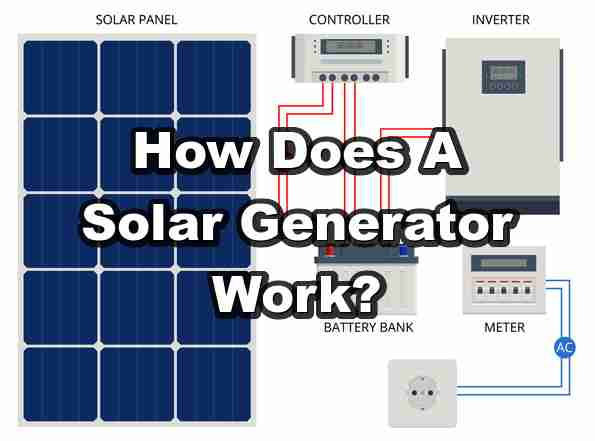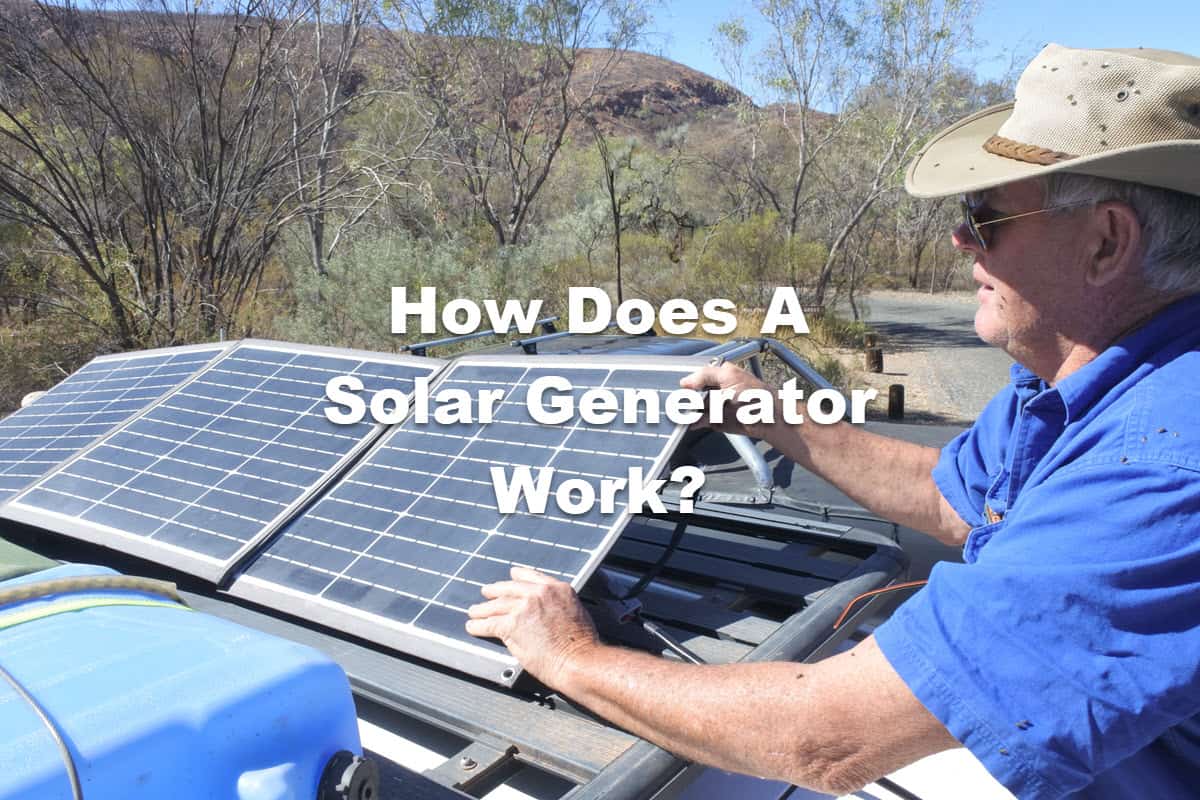Solar generators have become increasingly sophisticated and efficient in 2025, offering a clean and portable power solution for various applications.
This comprehensive guide explains the inner workings of modern solar generators, their benefits, and how they compare to traditional power sources.
Key Takeaways
- Solar generators convert sunlight into usable electricity through advanced photovoltaic technology
- Core components include high-efficiency solar panels, smart charge controllers, lithium-ion batteries, and pure sine wave inverters
- The process involves solar energy capture, conversion, storage, and distribution
- Modern solar generators offer significant advantages over traditional generators, including environmental friendliness and silent operation
- Emerging technologies in 2025 include AI-powered energy management and improved energy storage solutions
What Is a Solar Generator?
A solar generator is a portable power station that converts solar energy into electrical energy and stores it for later use.
Unlike traditional generators that rely on fossil fuels, solar generators capture sunlight through photovoltaic panels and store the energy in a battery. This makes them a cleaner, quieter, and more sustainable alternative to conventional generators.
Core Components of a Solar Generator
Solar Panels
At the heart of every solar generator are the solar panels.
These panels consist of photovoltaic cells that convert sunlight into direct current (DC) electricity. The efficiency and type of solar panels can significantly impact the generator’s overall performance. Modern solar panels are becoming increasingly efficient, allowing for greater power generation in smaller surface areas.
Charge Controller
The charge controller is a crucial component that regulates the flow of electricity from the solar panels to the battery. It prevents overcharging and ensures the battery receives the optimal amount of power. There are two main types of charge controllers:
- Pulse Width Modulation (PWM): More affordable but less efficient.
- Maximum Power Point Tracking (MPPT): More expensive but significantly more efficient, especially in varying light conditions.
Battery
The battery stores the electrical energy generated by the solar panels for later use. Most modern solar generators use lithium-ion batteries due to their high energy density, long lifespan, and lightweight properties. The battery’s capacity, measured in watt-hours (Wh), determines how much energy can be stored and how long the generator can power devices.
Understanding the lifespan of solar generators is necessary when considering the long-term value of your investment. Proper care and maintenance can significantly extend the life of your solar generator’s battery.
Inverter
The inverter converts the DC electricity stored in the battery into alternating current (AC) electricity used by most household appliances and electronic devices. Solar generators typically use either pure sine wave or modified sine wave inverters, with pure sine wave inverters providing cleaner, more stable power suitable for sensitive electronics.
Related: Understanding the Technology Behind Solar-Powered Generators
How Solar Generators Work: Step-by-Step Process
- Solar Energy Capture: Photovoltaic cells in the solar panels absorb sunlight.
- Energy Conversion: The panels convert sunlight into DC electricity through the photoelectric effect.
- Energy Regulation: The charge controller manages the flow of electricity to the battery, optimizing charging efficiency and preventing overcharging.
- Energy Storage: The battery stores the electrical energy for later use. The capacity determines how long the generator can power devices.
- Power Inversion: When needed, the inverter converts the stored DC electricity into AC electricity used by most household appliances and electronic devices.
- Power Distribution: AC electricity is made available through outlets for powering devices and appliances.
This process occurs seamlessly, providing a continuous source of clean energy as long as sunlight is available or the battery has charge. The efficiency of each step, from the solar panels’ performance to the inverter’s output, contributes to the overall effectiveness of the solar generator.

Advantages and Choosing the Right Solar Generator
Solar generators offer numerous benefits over traditional generators, making them an attractive choice for various applications. When selecting a solar generator, it’s important to consider these advantages alongside your specific needs.
Key Advantages
- Environmental friendliness: Solar generators produce clean, renewable energy without harmful emissions.
- Cost-effectiveness: After the initial investment, solar generators have minimal operational costs.
- Silent operation: Unlike noisy gas generators, solar generators work quietly.
- Low maintenance: With fewer moving parts, solar generators require minimal upkeep.
- Portability: Many models are designed for easy transport, ideal for outdoor activities.
Choosing the Right Solar Generator
When selecting a solar generator, consider the following factors:
- Power needs: Assess the wattage requirements of the devices you plan to power.
- Portability: Consider the weight and size if you need to transport the generator frequently.
- Battery capacity: Determine how long you need the generator to run between charges.
- Solar panel efficiency: Look for high-efficiency panels to maximize power generation.
- Inverter type: Choose a pure sine wave inverter for powering sensitive electronics.
By carefully evaluating these factors alongside the advantages of solar generators, you can select a model that best suits your needs, whether for emergency backup, outdoor activities, or off-grid living.
Related: How Long Can A Solar Generator Run
Applications of Solar Generators
Solar generators are versatile power solutions suitable for various scenarios:
- Emergency backup power during outages.
- Outdoor activities like camping and RVing.
- Off-grid living in remote locations.
- Construction sites and remote work locations.
- Disaster relief efforts.
Real-World Applications of Solar Generators in 2025
- Smart Home Integration: Solar generators now seamlessly integrate with home energy management systems, optimizing power usage and storage.
- Disaster Relief: Improved capacity and efficiency make solar generators crucial in emergency response scenarios.
- Off-Grid Living: Advanced energy storage solutions enable sustainable, long-term off-grid power solutions.
- Mobile Workstations: Compact, high-output solar generators power mobile offices and remote work setups.
- Agrivoltaics: Solar generators are integrated with agricultural activities, optimizing land use for both energy production and farming.
Maintenance and Care
To ensure optimal performance and longevity of your solar generator:
- Store in a cool, dry place when not in use.
- Regularly clean solar panels to maintain efficiency.
- Perform periodic battery maintenance as recommended by the manufacturer.
- Inspect connections and components for signs of wear or damage.
Future of Solar Generator Technology
The future of solar generator technology looks promising, with ongoing research and development focused on improving efficiency, storage capacity, and overall performance. Advancements in solar panel technology, such as the development of more efficient solar arrays, will contribute to the evolution of solar generators, making them even more powerful and versatile.
Conclusion
Solar generators represent a significant step forward in portable power solutions, offering a clean, quiet, and sustainable alternative to traditional generators.
By understanding how they work and considering your specific needs, you can choose the right solar generator to power your life, whether you’re preparing for emergencies, enjoying the great outdoors, or living off the grid.
As you explore your options, remember to assess your power requirements carefully and consider the long-term benefits of investing in a solar generator. With the right choice, you’ll have a reliable, eco-friendly power source that can serve you for years to come.
To learn more about how long solar generators can run and their capabilities, check out our article on how long a solar generator can run.
FAQs
How is AI revolutionizing solar energy efficiency?
AI is dramatically enhancing solar energy efficiency through several innovative approaches:
- Predictive maintenance: AI algorithms analyze sensor data to predict when components need maintenance, reducing downtime and extending system lifespan.
- Smart energy management: AI systems optimize energy distribution based on real-time consumption patterns, weather forecasts, and grid conditions.
- Solar panel optimization: AI-driven systems adjust panel orientations and track sunlight, significantly boosting solar energy efficiency.
- Real-time monitoring: AI platforms detect subtle inefficiencies or potential hardware issues before they escalate into major problems.
What advancements in energy storage are complementing solar technology?
Energy storage solutions are evolving rapidly to support the growth of solar energy:
- Solid-state batteries: These offer higher energy density, faster charging, and improved safety compared to traditional lithium-ion batteries.
- Flow batteries: Ideal for larger-scale applications, they provide longer duration storage and are more easily scalable.
- AI-driven storage management: Advanced algorithms analyze weather patterns and consumption trends to optimize energy storage and release.
- Integration with smart grids: Energy storage systems are becoming crucial components of smart grids, enabling better balancing of supply and demand.
How is agrivoltaics reshaping land use for solar energy?
Agrivoltaics, the combination of agriculture and solar energy production, is gaining momentum:
- Dual land use: Solar panels are installed above crops, providing partial shade and reducing water evaporation while generating clean energy.
- Improved crop yield: The partial shade from solar panels can enhance crop growth in certain climates, particularly in regions experiencing extreme weather.
- New revenue streams: Farmers can benefit from both energy production and agricultural activities, diversifying their income.
- Enhanced agricultural resilience: Agrivoltaics can help protect crops from excessive heat and reduce water requirements.
What role are transparent solar panels playing in urban environments?
Transparent solar panels are revolutionizing urban energy generation:
- Building integration: These panels can be seamlessly incorporated into windows, skylights, and building facades.
- Aesthetic appeal: Transparent solar panels allow for clean energy generation without compromising the visual appeal of buildings.
- Expanded applications: Beyond buildings, transparent solar panels are being integrated into vehicle sunroofs and portable electronics.
- Net-zero energy buildings: The integration of transparent solar panels is a significant step towards achieving net-zero energy buildings in urban environments.
How is AI improving forecasting for renewable energy production?
AI is enhancing renewable energy forecasting in several ways:
- Weather pattern analysis: AI algorithms process vast amounts of meteorological data to improve predictions of factors affecting solar energy production.
- Demand prediction: Machine learning models analyze historical consumption data and real-time factors to forecast energy demand more accurately.
- Grid stability management: AI-driven systems use improved forecasts to balance energy supply and demand, ensuring grid stability.
- Resource optimization: Better forecasting allows for more efficient allocation of resources, reducing waste and improving overall system performance.

Leave a Reply